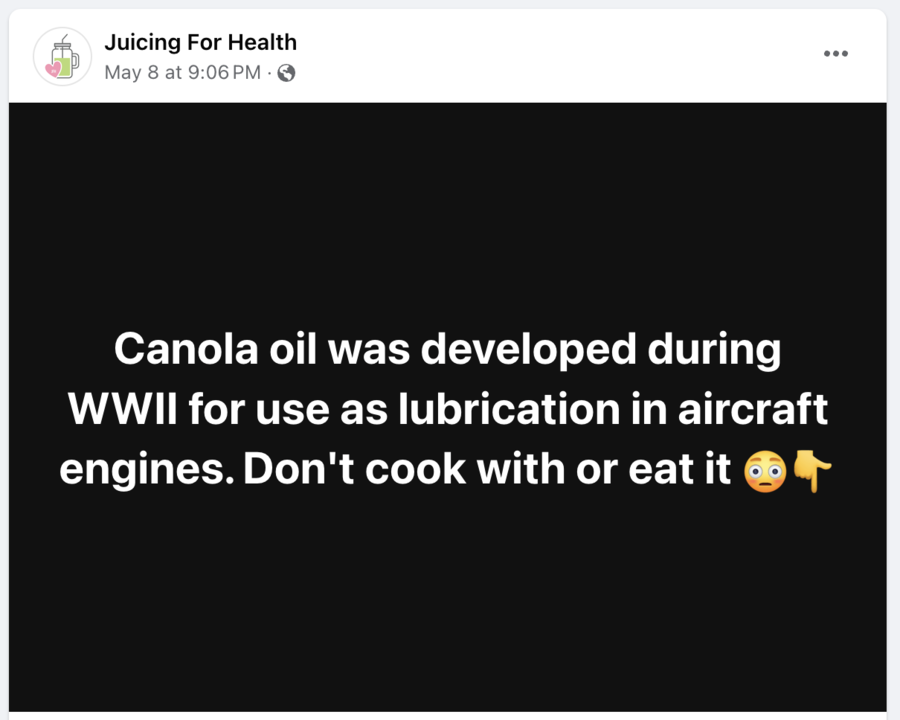
Was canola oil first developed as an engine lubricant during World War II, as a post on Facebook claimed? No, that's not true: Canola oil is made from a species of plant specially bred from rapeseed. Oil from rapeseed was used during World War II as a mechanical lubricant. However, canola oil, as we know it today, was developed in the 1970s and has a very different nutritional profile than rapeseed oil. Canola oil is safe for human consumption, the Food and Drug Administration says.
A version of the claim appeared in a post on Facebook on May 8, 2024 (archived here), with a text overlay that read:
Canola oil was developed during WWII for use as lubrication in aircraft engines. Don't cook with or eat it. 😳👇
This is how the post appeared at the time of the publication of this fact check:
(Source: Facebook screenshot taken on Fri May 10 20:50:24 2024 UTC)
The canola is a genetic variation of rapeseed that Canadian plant breeders developed in the 1960s and '70s, writes the North Dakota-based organization Northern Canola Growers Association (archived here). Oil from rapeseed, the plant from which canola originated, was used as a lubricant during World War II. According to the Canola Council of Canada (archived here):
The need for Canadian rapeseed production arose from the critical shortage of rapeseed oil that was needed by Allied forces during World War II and were supplied by Canada to break the blockade of European and Asian sources in the early 1940s. The oil was urgently needed as a lubricant for the rapidly increasing number of marine engines in naval and merchant ships.
Canola oil is different than the rapeseed oil used as a wartime lubricant. Canola oil is a food-grade version derived from rapeseed that is specifically bred for low erucic acid content (archived here), a monounsaturated fatty acid. The canola plant belongs to the Brassica plant family, along with mustard, broccoli and cauliflower. It's grown in the U.S., Canada, Australia, Europe and China, according to the U.S. Canola Association (archived here).
The Canadian informational group canolaInfo.org (archived here) adds that canola oil (archived here) and rapeseed oil (archived here) have very different nutritional values.
In the early 1960s, Canadian scientists used traditional plant-breeding techniques to "practically eliminate two undesirable components of rapeseed -- erucic acid from oil and glucosinolates from meal -- to create 'canola,' a contraction of 'Canadian' and 'ola,'" notes the U.S. Canola Association (archived here).
The first "double low" variety -- low in both of these undesirable components -- was developed in 1974, according to the Northern Canola Growers Association (archived here).
In 1978, "Canola" was registered as a trademark in Canada, the Manitoba Canola Growers (archived here) states.
In an email received on May 10, 2024, a Food and Drug Administration official told Lead Stories that "Canola Oil is an ingredient that is Generally Recognized as Safe (GRAS)" (archived here).
Other Lead Stories debunks of health-related claims can be read here.















